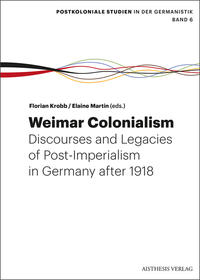
This volume examines aspects of the German colonial consciousness following the end of empire in 1918. Entirely stripped of colonial possessions under the Treaty of Versailles, Germany, unlike other European nations, was faced with the end of empire well before the end of the European colonial project. This loss left behind a complex legacy that permeated the political, literary and cultural discourses of the postwar period. By scrutinising the resonances between literary intervention and public discourses, and between their respective agendas and methods, the contributors tease out the intricacies of the colonial debate in Weimar Germany. Weimar revanchism is unveiled as an attempt to salve a humiliated national ego and refashion Germany as a model agent of the ‘civilising mission’ in colonial space against the backdrop of military defeat, political collapse and foreign occupation. The contributions also highlight the framing of Eastern European and Near Eastern space as colonial, the complex mediality of colonial debate and the lasting political and literary legacy of “Weimar Colonialism”.